
RNA - “Landslide and flood risk hazard mapping reveal that at least 100,000 people are in grave danger from these risks and require relocation to new areas or within the neighborhoods that they live in,” the UN warned in a humanitarian report on Monday.
“A high percentage of the land is unsuitable for human settlement as risks of flooding and landslides are high and are further aggravated by the congestion and extensive terracing of the hills,” the UN report added.
The report further cautioned that flooding and mudslides in the forthcoming monsoon season would worsen the already dire humanitarian situation at the border refugee camps.
“The lack of space remains the main challenge for the sector as sites are highly congested leading to extremely hard living conditions with no space for service provisions and facilities. In addition, congestion brings increased protections risks and favors disease outbreak such as the diphtheria outbreak currently escalating in most of the sites,” it added.
The World Health Organization has vaccinated over 500,000 Rohingyas against diphtheria and on Saturday health workers began giving 350,000 children a second dose.
But a new health concern has arisen - mumps.
The UN report said there had been an increase in cases in the past few weeks, and that Rohingya refugees and host communities had never been vaccinated against the highly contagious disease.
There are currently more than 900,000 Rohingya refugees sheltered in Cox’s Bazaar near the Bangladeshi border.
Of this number, more than two-thirds -- 600,000 -- have fled Myanmar since late August after military forces and Buddhist mobs renewed their cycle of attacks on the Muslim community in Rakhine State.
The Rohingya have lived in Myanmar for generations but are denied citizenship and are branded illegal immigrants from Bangladesh, which likewise denies them citizenship.
Myanmar and Bangladesh have reached an agreement to repatriate hundreds of thousands of Rohingya Muslims within a period of two years.
The UN, however, says it is not yet safe for the Rohingya refugees to begin returning home, and that issues related to their safety needed to be addressed before their repatriation.
847/940